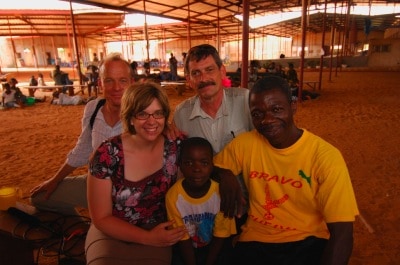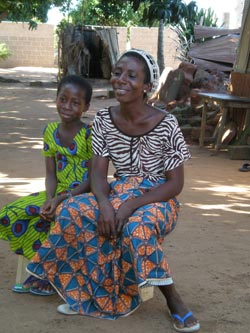One Child, Each Child, Every Child Is Special
As you know, we recently announced our millionth sponsored child. Now, I won’t tell you a lot of random facts about 1 million.
Like how long it would take you to count to 1 million (14 days).
Or how much 1 million dollar bills weigh (2,204 pounds).
Because as important as 1 million is, and as huge of a milestone as 1 million sponsored children is, it’s really just about one child.
And a few weeks ago, I got to meet that one child — Fellow Blewussi Kpodo. He lives in a dusty community just outside of Lomé, Togo.
Fellow’s whole family had come out for our meeting. His father stood proudly, his arm on the shoulder of his oldest son. Fellow’s two older sisters darted in and out of the house, covering their faces and giggling at the sight of my pale skin. His younger brother made himself at home in my lap.
All the while, Fellow watched the commotion with his solemn brown eyes.
I stared at his eyes when he wasn’t looking. Fringed with dark eyelashes, I wondered at what they had seen.
They had watched his father battered by grief when Fellow’s mother died five years ago.
They had filled with tears when the headmaster sent him home from school because he didn’t have his school fees — again.
They had stung with smoke as he bent over the small fire he prepared every evening for his sisters to cook cassava and dried fish for dinner.
And now, those same eyes sought out mine.
“He has a question for you,” explained the interpreter. I nodded. “He wants to know if you know his sponsor.”
I grinned at Fellow, and for the first time a smile reached his eyes.
“I don’t know her,” I explained. “But I know that you are very special to her.”
And in that moment, everything else faded away. Fellow wasn’t one of a million children. He was just one.
One child.
One sponsor.
One more step toward changing the world.

Continue Reading ›“The child must know that he is a miracle, that since the beginning of the world there hasn’t been, and until the end of the world there will not be, another child like him.” – Pablo Casals
Afi’s Angle
I’m currently on a story-gathering trip in Lome, Togo, our newest country, which is where I met Afi.
Afi stood shyly inside her home as we hauled in our gear — cameras, video equipment, tripods and microphones. Her dusty yard was shaded by heavy papaya trees, offering a bit of relief from the hot sun that had beat down on us for the past few hours.
I sat on a small wooden stool, worn smooth.
 Afi’s brothers crowded onto a splintered bench that leaned against a tree trunk. Afi and her mother sat close together, a microphone just a few inches from their heads.
Afi’s brothers crowded onto a splintered bench that leaned against a tree trunk. Afi and her mother sat close together, a microphone just a few inches from their heads.
The interview went smoothly. But my mind is one of a journalist. So I sat there, gnawing on my pen cap, wondering what my “angle” would be.
My thoughts were interrupted when one of the child development center workers leaned close and began whispering to me.
She told me that 8-year-old Afi had been to school for only three months in her entire life. Yet, just a few weeks ago she had tested eighth out of the 50 children in her class.
This quiet little girl in front of me, the one who swept the dirt yard of her family’s compound at this very moment, was brilliant. And it hit me.
Afi wasn’t a rebellious child who had been reformed by Compassion. She was relatively healthy. Her parents loved her and had never abused her.
But if not for the support of Compassion, Afi would have slipped through the cracks. She would have spent entire days on the futile task of sweeping that very dirt yard.
I don’t know if she would have found some other way to further her education. I don’t know if God would have provided some other way for her to overcome.
But I don’t have to wonder about those things. Afi is in school now. She is learning and growing every day.
I know that she has opportunities that didn’t exist for her a year ago. And I know that she has not slipped through the cracks.
I believe Afi’s world has been changed.
But I also believe that Afi will change the world.
That is Afi’s angle.
199
Continue Reading ›“How many children are at the project we’re going to?” I asked the Compassion worker as we finished up lunch.
“One hundred ninety-nine,” she answered. What an odd number. She must have noticed my confused look.
“They lost a child last month.”
I wished with everything that “lost a child” literally meant lost a child. As in just misplaced for a few days. She would be back soon. But I knew that wasn’t the case.
“What happened to her?” someone else at the table asked. I couldn’t bring myself to say it. I couldn’t acknowledge what “lost” really meant.
Read the rest of the entry at I’m Just Sayin’


